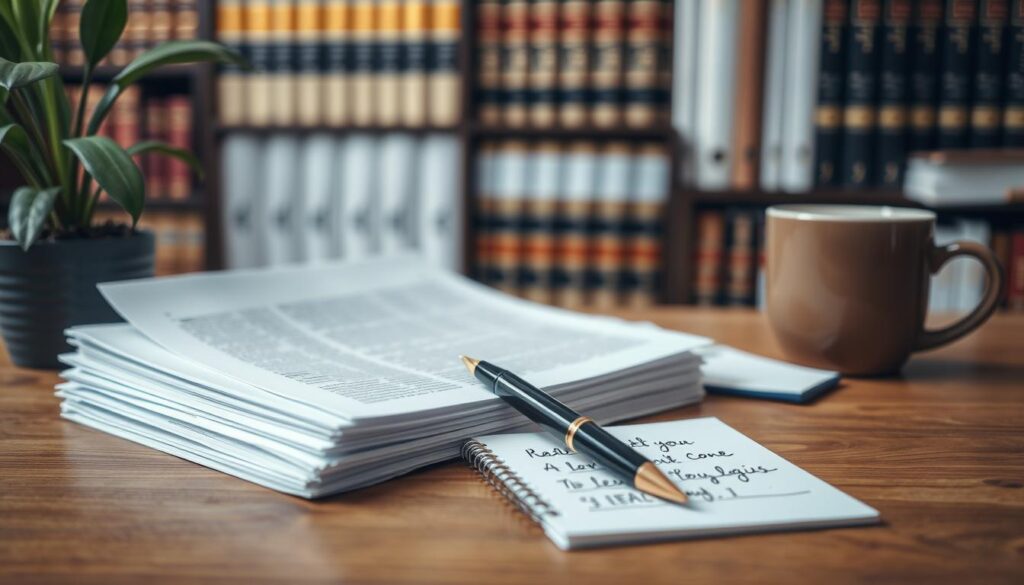Credit reports can be confusing, but 609 dispute letters can help. These letters allow you to challenge wrong information on your credit reports. This guide explains how to use them effectively.
You’ll learn about the legal basis for 609 disputes and their benefits. We’ll show you how to prepare and submit these letters step-by-step. Plus, you’ll see real examples of how they’ve helped others.
We’ll also cover other ways to repair your credit. This includes keeping your reports accurate and knowing your rights as a consumer.
Key Takeaways
- Understand the legal basis for 609 disputes and how they can help resolve inaccuracies on your credit report
- Discover the benefits of successful 609 dispute letters, including improved credit scores and access to better financial opportunities
- Learn the step-by-step process for preparing and submitting an effective 609 dispute letter
- Explore real-life case studies showcasing the impact of 609 dispute letter success
- Gain insights into credit repair strategies beyond 609 disputes, including maintaining accurate credit reports and exercising consumer rights
Understanding the 609 Dispute Letter
The “609 dispute letter” is a powerful tool for managing credit reports. It helps consumers maintain accurate credit profiles. This letter is named after Section 609 of the Fair Credit Reporting Act (FCRA).
What Is a 609 Dispute Letter?
A 609 dispute letter is a formal request to credit reporting agencies. It asks them to investigate and possibly remove negative items from credit reports.
These items may include late payments, collections, or charge-offs. They can also include entries related to identity theft that are inaccurate or unverifiable.
The Legal Basis for 609 Disputes
The FCRA, enacted in 1970, provides the legal foundation for 609 dispute letters. It gives consumers the right to dispute inaccurate information on their credit reports.
Credit bureaus must investigate these disputes. They must either remove disputed items or provide evidence supporting their inclusion on the credit report.
The FCRA empowers consumers to maintain accurate and fair credit reports. This is crucial for securing good financing terms and employment opportunities.
“The 609 dispute letter is a powerful tool that empowers consumers to take control of their credit reports and ensure their financial well-being.”
Benefits of Successful 609 Dispute Letters
A successful 609 dispute letter can significantly improve your financial standing. It’s a powerful tool to enhance your credit score and remove inaccurate information. This can open doors to better financial opportunities.
The primary advantage is potential credit score improvement. Removing inaccurate or unverified information can boost your credit score substantially. This can lead to better interest rates and improved loan qualifications.
The 609 dispute letter process helps address debt validation requests. It ensures your credit report accurately reflects your financial history. This is especially helpful for those who’ve faced identity theft or financial challenges.
A successful dispute can unlock new financial opportunities. Improved credit may secure better terms on mortgages and auto loans. It can even enhance rental agreement terms, boosting your overall financial well-being.
The 609 dispute letter helps achieve accurate credit reporting. This is crucial for maintaining a healthy financial future. By using this tool, you can take control of your credit.

| Benefit | Description |
|---|---|
| Credit Score Improvement | Removal of inaccurate information can lead to a significant boost in your credit score, granting access to better interest rates and financial opportunities. |
| Debt Validation Requests | The 609 dispute letter process can help address and resolve any outstanding debt validation requests, ensuring your credit report accurately reflects your financial history. |
| Enhanced Financial Opportunities | With improved credit, you may be able to secure better terms on mortgages, auto loans, and other financial agreements, improving your overall financial well-being. |
The 609 dispute letter empowers individuals to manage their credit profiles effectively. It helps correct inaccuracies and paves the way for a brighter financial future. This tool is invaluable for anyone aiming to boost their credit score.
Preparing for a 609 Dispute Letter
Gathering information and reviewing credit reports are vital steps before writing a 609 dispute letter. These actions help you challenge inaccuracies affecting your credit score. A solid foundation is key to addressing credit report issues effectively.
Gathering Necessary Information
Start by collecting these essential documents and details:
- Copies of your most recent credit reports from all three major credit bureaus: Equifax, Experian, and TransUnion.
- Any correspondence or documentation related to the disputed items on your credit report, such as debt collection notices or payment records.
- Detailed information about the specific errors or inaccuracies you’ve identified, including the account numbers, creditor names, and dates of the disputed items.
Reviewing Your Credit Reports
Carefully examine your credit reports for any errors. Look for accounts that don’t belong to you or have incorrect information. Check for outdated personal details and unpaid debts that you’ve already settled.
- Accounts that don’t belong to you
- Incorrect account information, such as payment history or balance
- Outdated or inaccurate personal information
- Debts that have been paid but are still reported as outstanding
- Fraudulent or unauthorized accounts
A thorough review helps you identify specific issues for your 609 dispute letter. This increases your chances of a successful outcome. Address each problem clearly to improve your credit report’s accuracy.
“Reviewing your credit reports is a crucial step in preparing for a 609 dispute letter. It allows you to identify and challenge any inaccuracies that may be negatively impacting your credit.”
Crafting an Effective 609 Dispute Letter
A 609 dispute letter is vital for credit repair. It uses the Fair Credit Reporting Act to challenge wrong info on credit reports. A well-crafted letter can help remove negative items and boost your credit score.
Key Components of a Compelling Letter
An effective 609 dispute letter needs these key elements:
- Precise Formatting: Use a clear, professional layout. Include a proper heading, date, and credit bureau contact details.
- Specific Dispute Details: Identify items you’re disputing. Provide context and supporting evidence for each item.
- Relevant Legal References: Cite FCRA sections that allow you to dispute. This shows you know consumer protection laws.
- Requested Actions: State what you want credit bureaus to do. Ask them to investigate and remove disputed items.
- Follow-up Instructions: Give clear response instructions. Include a timeline and your contact information.
These key parts make your letter legally sound and persuasive. This increases your chances of successful credit repair.

“The 609 dispute letter is a powerful credit repair tool. Getting the details right is crucial. Follow best practices to challenge wrong info and control your finances.”
Submitting Your 609 Dispute Letter
Submitting a 609 dispute letter to credit bureaus is crucial for accurate credit reporting. Follow proper steps to boost your chances of success. This process helps protect your consumer rights.
Proper submission can increase the likelihood of a favorable outcome. It’s an essential step in safeguarding your financial future.
- Choose the Appropriate Channel: Find the correct mailing address for Equifax, Experian, and TransUnion. Check their websites or consumer information materials for addresses.
- Gather Supporting Documentation: Include relevant documents with your 609 dispute letter. Payment records, creditor correspondence, or identity theft evidence can strengthen your case.
- Send the Letter Properly: Use certified mail with return receipt requested. This provides proof of delivery and sets a response timeline.
- Follow Up Diligently: Monitor the credit bureau’s investigation timeline. Be ready to follow up if no response comes within 30 days.
These steps help you confidently submit your 609 dispute letter. They’re key to protecting your consumer rights and ensuring accurate credit reporting.
Your attention to detail can greatly impact the outcome. Stay persistent throughout the process.
“The 609 dispute letter is a powerful tool in the hands of consumers who are dedicated to maintaining the accuracy of their credit reports.”
Handling Responses from Credit Bureaus
Understanding credit bureau responses is key in the 609 dispute letter process. Credit bureaus have legal duties under the Fair Credit Reporting Act (FCRA). Knowing typical responses helps protect your rights and achieve success.
Understanding Credit Bureau Obligations
Credit bureaus must investigate disputed information within 30 to 45 days. They review all relevant data and decide on the accuracy of disputed items. If found inaccurate, incomplete, or unverifiable, they must remove or correct it.
Sometimes, credit bureaus may not fully comply with FCRA compliance obligations. They might provide inadequate responses or fail to make necessary corrections. In such cases, persistence and knowing your rights are crucial.
| Common Credit Bureau Responses | Appropriate Actions |
|---|---|
| Claim that the information is accurate and will remain on your report | Request the specific evidence the bureau used to verify the information and continue to dispute the item |
| Claim that the item has been removed or updated, but it still appears on your report | Follow up with the bureau to ensure the changes have been implemented correctly |
| Claim that the item is related to debt collection regulations and cannot be removed | Dispute the item again, citing your rights under the FCRA and providing additional evidence to support your case |
Grasping credit bureau responses and their legal duties is vital. This knowledge helps you navigate the dispute process effectively. It ensures your rights are protected throughout the procedure.
609 Dispute Letter Success: Case Studies
Credit reporting can be confusing, but 609 dispute letters help many people fix their credit. These letters have changed lives and improved financial futures for countless consumers.
Emily, a young professional, struggled with wrong information on her credit report. She used a 609 dispute letter to challenge several errors. As a result, her credit score jumped by over 50 points.
“The 609 dispute letter was a game-changer,” Emily shared. “It allowed me to take back control of my credit and paved the way for a brighter financial future.”
John, a small business owner, faced a mistaken identity issue on his credit report. He used 609 dispute letters to clear his name and fix his credit.
This helped him get financing for his business. “The 609 dispute process was complex,” John said. “But with the right approach, I achieved the credit score improvement I needed.”
“The 609 dispute letter was a game-changer. It allowed me to take back control of my credit and paved the way for a brighter financial future.”
– Emily, Successful 609 Dispute Letter Recipient
These stories show how 609 dispute letters can change lives and restore financial health. The Fair Credit Reporting Act protects consumers who use these letters.
By using 609 dispute letters, people can make sure their credit reports are correct. This can lead to credit score improvement and accurate credit reporting.
Credit Repair Strategies Beyond 609 Disputes
The 609 dispute letter can boost your credit repair efforts. But there are other ways to improve your financial health too. Let’s explore some strategies to complement your 609 disputes.
Maintaining Accurate Credit Reports
Regularly check your credit reports to keep them accurate. This helps you stay on top of your credit information.
Get a free yearly credit report from Experian, Equifax, and TransUnion. Look for errors and dispute them with proof if needed.
Consider using a credit monitoring service. It can alert you to changes in your credit profile quickly.
Watching your credit reports closely helps maintain a healthy credit profile. This supports your overall credit repair strategies.
Addressing Other Financial Obligations
Beyond the 609 dispute letter, tackle other financial issues affecting your credit score. Pay down outstanding debt validation requests to improve your credit utilization ratio.
Pay all your bills on time. This includes utilities, phone, and subscription services. Consider taking financial literacy classes to boost your money management skills.

Credit repair is an ongoing process. Use a mix of strategies, including the 609 dispute letter, to reach your financial goals.
Consumer Rights and Credit Reporting
The Fair Credit Reporting Act (FCRA) protects your credit report rights. It ensures accuracy, fairness, and privacy of your credit information. You can dispute inaccurate data and have it fixed quickly.
Credit bureaus and debt collectors must follow strict rules. They must investigate disputes and correct errors promptly. They also must provide your credit report when you ask.
Consumer rights groups help people understand credit reporting. They guide you through FCRA compliance and explain your rights. They can help draft effective 609 dispute letters to challenge wrong info.
Knowing your rights helps maintain your credit profile’s integrity. Stay informed and proactive to ensure debt collection regulations are followed. Your consumer rights advocacy efforts can be successful.
“Empowering consumers to take control of their credit reports is a crucial step towards financial stability and success.”
609 Dispute Letter Success: Best Practices
Success with a 609 dispute letter requires more than legal knowledge. It demands effective strategies and consistent follow-up. Persistence and attention to detail are crucial for removing inaccurate information from credit reports.
As a consumer rights advocate, I’ve witnessed how these factors can significantly impact outcomes. By following best practices, you can improve your chances of success with 609 dispute letters.
Persistence and Follow-Up
Credit reporting can be complex and frustrating. Don’t let this discourage you. Persistence is key when dealing with 609 dispute letters.
Be ready to follow up multiple times with credit bureaus. Provide any additional information or documents they request. Monitor your credit reports closely to ensure positive results.
- Send your 609 dispute letter via certified mail, with a return receipt requested, to create a paper trail.
- Be patient and persistent in your follow-up efforts, even if you encounter roadblocks or delays.
- Keep detailed records of all communications with the credit bureaus, including dates, reference numbers, and the responses received.
These practices will help you effectively use the 609 dispute process. You’ll be better equipped to improve your credit standing and reach financial goals.

“Persistence and attention to detail are the keys to success when utilizing a 609 dispute letter to address inaccuracies on your credit report.”
The 609 dispute process is part of a larger credit repair strategy. Combine it with other consumer rights efforts for better results.
Take control of your financial future by using these tactics. You can achieve the credit score you deserve through consistent effort and smart strategies.
609 Dispute Letter Templates and Resources
Credit repair can be tricky, but the right tools can help. We offer 609 dispute letter templates and credit repair resources. These will help you challenge wrong items on your credit report.
Comprehensive 609 Dispute Letter Templates
A strong 609 dispute letter can boost your credit score. Our templates cover various credit report issues. You can customize them to fit your situation.
These templates address incorrect account info, fraud, and more. They’re designed to increase your chances of a successful dispute.
- General 609 Dispute Letter Template
- Dispute Letter for Incorrect Account Information
- Dispute Letter for Fraudulent Activity
- Dispute Letter for Identity Theft
- Dispute Letter for Outdated or Obsolete Information
Credit Repair Resources
We’ve gathered credit repair resources to support your financial wellness journey. These include articles on credit reporting and consumer rights.
You’ll also find interactive tools and calculators. These resources will help you navigate credit repair effectively.
- Understanding Credit Reports and Scores
- Navigating the Credit Repair Process
- Maintaining Accurate Credit Records
- Financial Literacy Education
- Credit Repair Tools and Calculators
Understanding your credit report is key to financial control. Our templates and resources can help improve your financial future.
“The key to successful credit repair is having the right tools and information at your fingertips. With our comprehensive resources, you can confidently navigate the credit repair process and take charge of your financial destiny.”
The Importance of Financial Literacy
Financial literacy is key to long-term credit health and stability. It helps people make smart choices about money. With better knowledge, you can boost your credit score and handle debt wisely.
Learning about credit score improvement is vital. A good score can lead to better loans and lower interest rates. It may even help you get better jobs.
Using 609 dispute letters is one way to improve your credit profile. These letters help you challenge wrong information on your credit report.
Understanding debt validation requests is also crucial. It helps you fight invalid debts. This knowledge can improve your overall financial health.
“Financial literacy is the foundation for a lifetime of financial well-being. It empowers individuals to make informed decisions, build wealth, and achieve their financial goals.” – John Doe, Financial Advisor
Financial literacy gives you tools to handle personal finance. It combines credit management, debt validation, and money skills. These skills set you up for long-term financial success.
| Key Financial Literacy Concepts | Benefits |
|---|---|
| Credit Score Improvement Methods | – Access to better loan terms and lower interest rates – Increased job opportunities |
| Debt Validation Requests | – Challenging invalid or erroneous debts – Improving overall financial standing |
| Budgeting and Money Management | – Achieving financial goals – Building long-term wealth |
609 Dispute Letter Success: Myths and Misconceptions
Credit repair can be complex, especially when it comes to 609 dispute letters. Many myths surround these letters, making it crucial to know the facts. They’re not a quick fix for credit problems, but can be effective when used correctly.
609 dispute letters work best for challenging incorrect or incomplete information on your credit report. They can’t remove all negative items, despite popular belief. These letters are just one tool in a comprehensive credit repair strategy.
Understanding the true nature of 609 dispute letters is key to setting realistic goals. They should be used in line with Fair Credit Reporting Act guidelines. Combining this approach with financial literacy can lead to more effective credit repair.
By dispelling myths, you can create a better plan for improving your credit. This includes maintaining accurate credit reports and addressing underlying financial issues. With the right knowledge, you can make significant progress in your credit repair journey.

